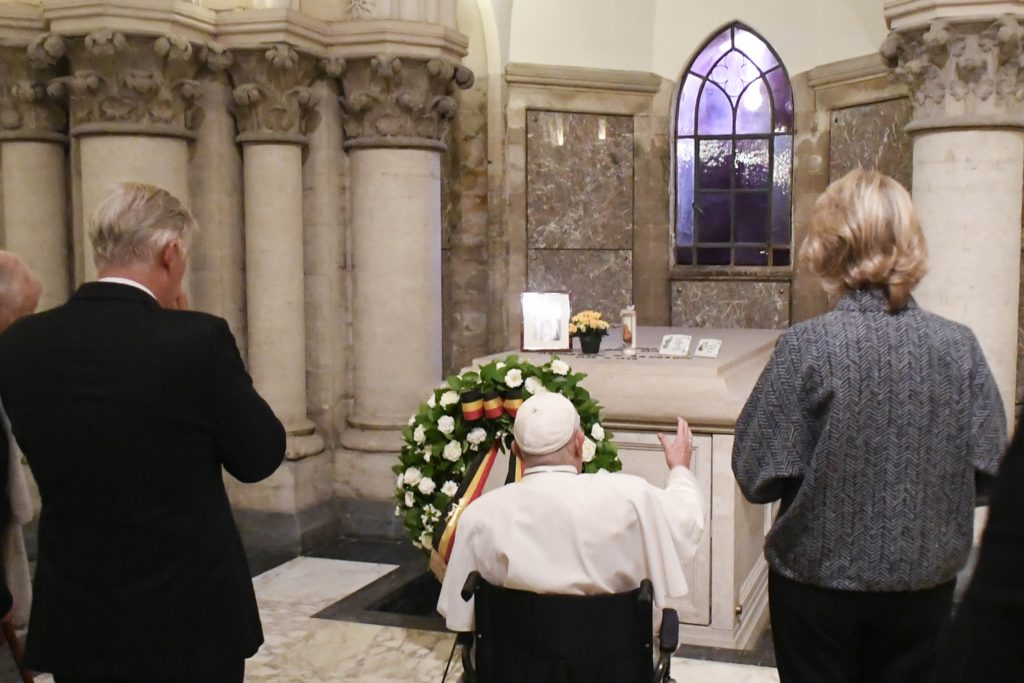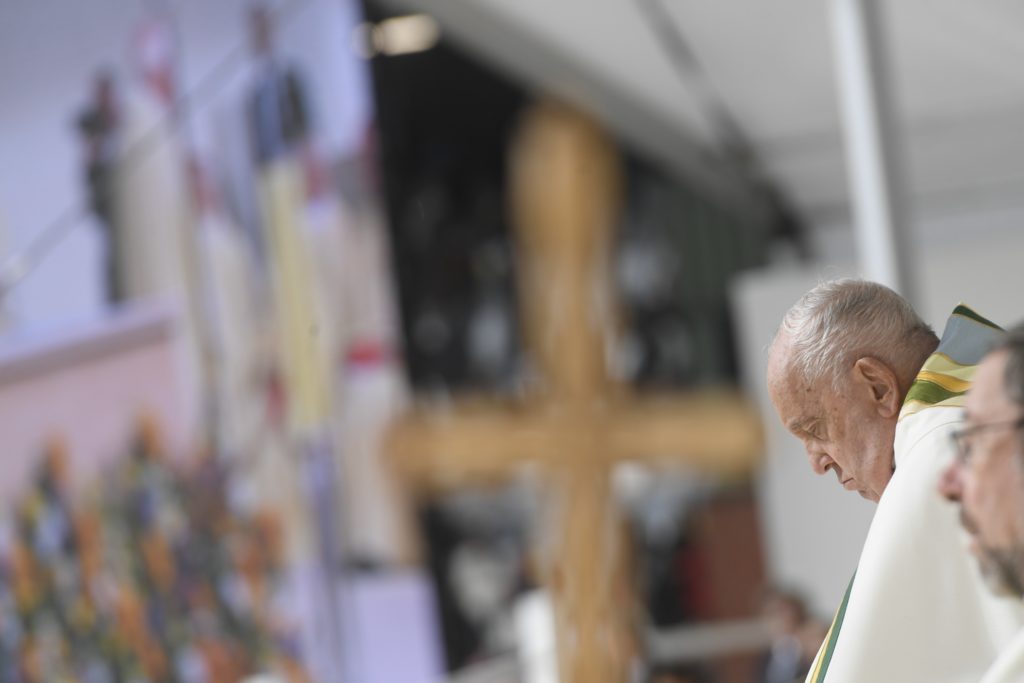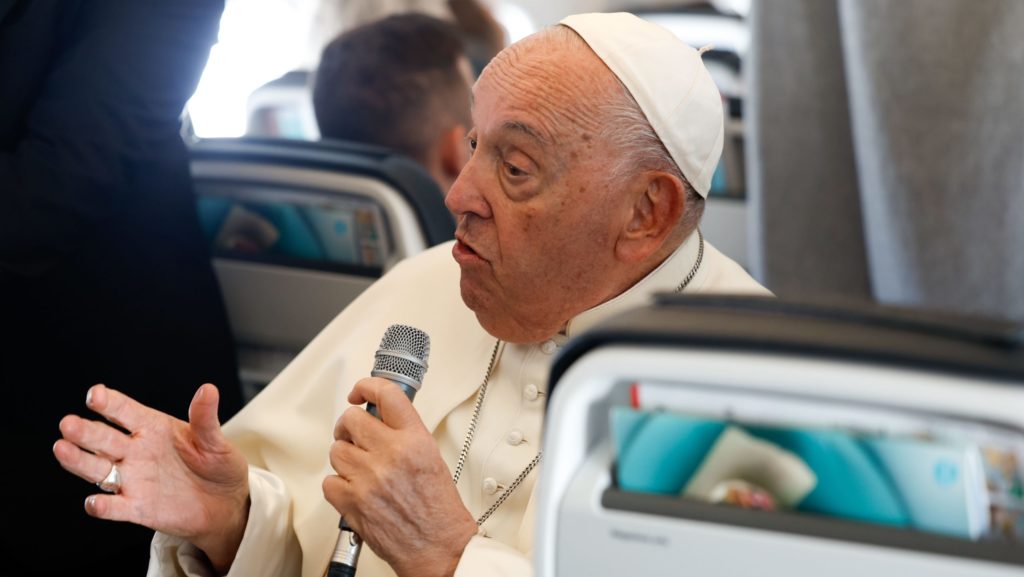Pope Francis on Sunday brushed aside criticism of his rhetoric on women during his weekend trip to Belgium, insisting that to masculinize women is “not Christian” and the product of an “exaggerated feminism.”
Francis then invoked a classic Argentine trope, a reference to the Tango, to imply that suggestions he has a conservative mentality vis-à-vis women, or their role in the Catholic Church, are ridiculous.
Yet the pope may actually have added more fuel to the fire at another point, when, referring to Belgium’s former King Baudouin, who resigned for a day in 1990 rather than sign a law legalizing abortion, Francis praised his courage by saying what he did required “a politician with pants.”
In comments to reporters aboard the papal plane returning from Belgium, Francis was responding to blowback over his language on women during a Friday session at the Catholic University of Leuven, when he said, “What characterizes women, that which is truly feminine, is not stipulated by consensus or ideologies, just as dignity itself is ensured not by laws written on paper, but by an original law written on our hearts.”
The university issued an immediate statement expressing “incomprehension and disapproval,” calling the pope’s stance “deterministic and reductive” and urging the church to push for greater inclusion “without any form of discrimination.”
In response on Sunday, Francis said he often speaks out about the dignity of women, and that “to masculinize the church, to masculinize women, is not human, it’s not Christian.”
“Femininity has its own strength,” he said, saying women are “more important than men because the Church is a woman, she is the bride of Christ.”
“If this, to those women, seems conservative, I am Carlo Gardel,” he said, referring to a famed French-Argentine Tango musician, indicating he finds the idea absurd.
Pope Francis said that he sees in the negative reactions “that there is an obtuse mentality that doesn’t want to hear this spoken about. Women are equal to men, they are equal.”
“An exaggerated feminism that wants to see the feminine masculinized, that doesn’t work. One thing is masculinism, which doesn’t work, the other is feminism that doesn’t work. What works is the woman church that is greater than the priestly ministry,” he said.

At another stage, he was asked about his decision to advance the beatification cause of King Baudouin.
“The king was courageous, because faced with a death law, he didn’t sign it and he resigned. It required courage, you needed a politician with pants to do this, you need courage” he said, in a remark that will likely draw criticism from some quarters.
On a different front, Francis also addressed the ongoing war in Gaza, with reporters asking if he felt Israel had “gone too far” in its latest attacks on Hezbollah.
Raising his hand to his face in an apparent gesture indicating that he was pained by the situation, Francis said he calls the Catholic parish in Gaza every day, where some 600 people are sheltering, and they fill him in on “the cruelty that happens there.”
“Defense,” he said, “must always be proportionate to the attack. When there is something disproportionate, it makes you see a dominating tendency that goes beyond morality.”
“A country that with its forces, I’m talking about any country, that does these things in such a superlative way, these are in immoral actions,” he said, saying that while war itself is immoral, the rules of war indicate a morality that must be “safeguarded.”
When this isn’t done, he said, it is clear that there is “bad blood in these things.”
His remarks come after Israeli military carried out dozens of air raids throughout Lebanon over the weekend targeting Hezbollah, which left 11 people dead.
Israel assassinated the group’s leader Hassan Nasrallah Saturday, and on Sunday killed Nabil Kaouk, another high-ranking Hezbollah official, dealing a significant blow to the group amid a cross-border conflict that has been broiling since last October.
Hezbollah began firing rockets at Israel in solidarity with citizens of Gaza, with the death toll in Israel’s retaliation to an Oct. 7, 2023, attack having reached around 41,000. Hezbollah has set a ceasefire in Gaza as a condition to stop its cross-border attacks.
Pope Francis also addressed the issue in his Sunday Angelus address, saying Lebanon, which he has always hailed as a regional message of tolerance and peaceful coexistence, is now “a tormented message.”

“This war has devastating effects on the population. Many, too many people continue to die day after day in the Middle East,” he said, and called for an immediate ceasefire.
Asked about the clerical abuse scandals and his meeting with Belgian survivors, during which they presented him with a list of requests, Francis said listening to abuse victims is “a duty.”
Regardless of whatever the percentages are on abuse in the family or educational institutions versus the church, “That doesn’t matter to me. I take what’s in the church,” he said.
“We have a responsibility to listen the abused, and to care for them. Some need psychological treatment, to help with this,” he said, saying not only must victims be cared for, but perpetrators must also be punished.
“Abuse is not a sin that’s there today and tomorrow maybe it’s not, it’s a tendency, it’s a psychological illness and because of this we must put them in treatment,” he said. “You can’t leave an abuser free in normal life with responsibilities in parishes and schools.”
He noted that some bishops, after a priest has been accused and condemned, give them an assignment working in a library, away from the parish and away from children.
“We must go forward with this,” he said, saying the shame of the church “is in covering up. We must not coverup.”
He also touched on the issue of abortion, saying women “have a right to life, their lives and the lives of their children.”
As he has in the past, he called abortion “homicide,” saying, “you are killing a human being” and calling the doctors who perform abortions “hitmen.”
“Women have the right to protect life. Another thing is anti-conception methods, this is something else, don’t confuse them. Right now, I am speaking only on abortion. You can’t debate this. I’m sorry, but it’s the truth.”
Pope Francis visited Luxembourg and Belgium from Sept. 26-29, largely to celebrate the 600th anniversary of the founding of the Universities of Leuven and Louvain, which date to 1425, when a single university in what is today Belgium was founded by Pope Martin V.
However, they split in the 1960s, resulting in the establishment of two separate universities: the Dutch-speaking KU Leuven and the French-speaking Université Catholique de Louvain (UCL).

